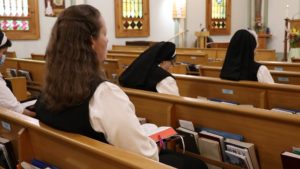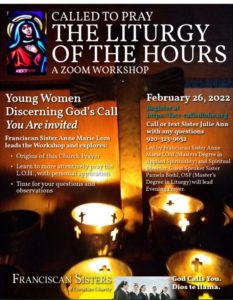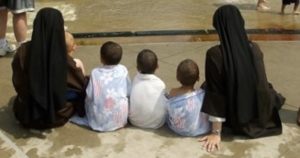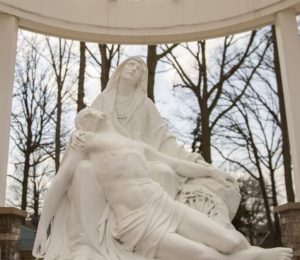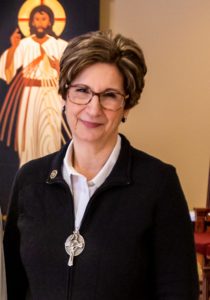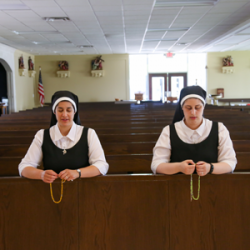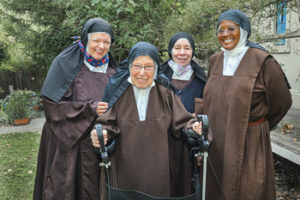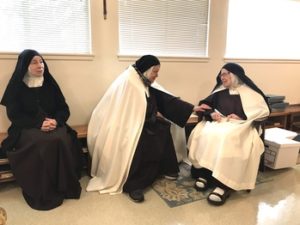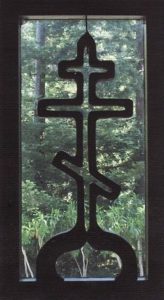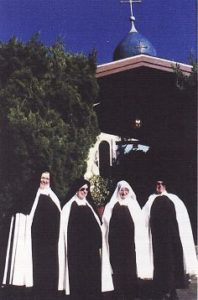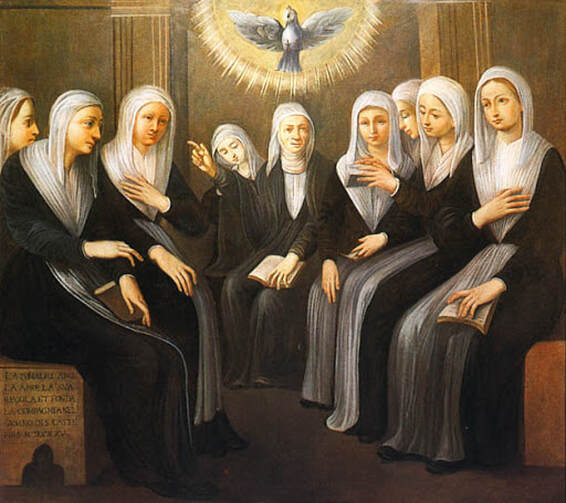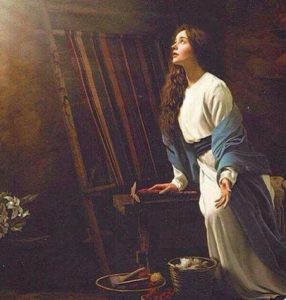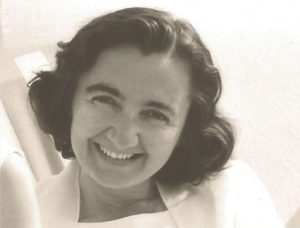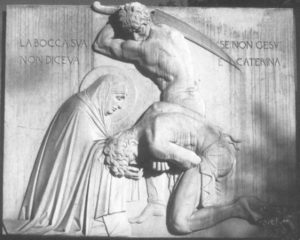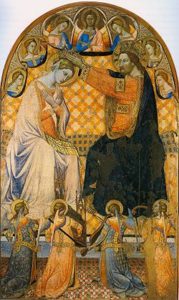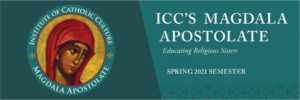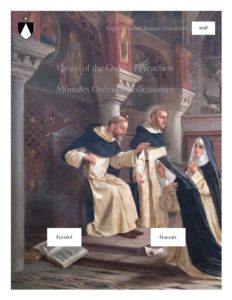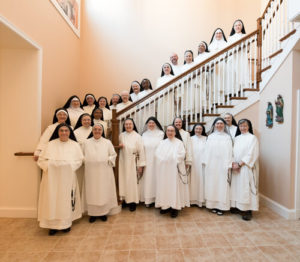 Live + Jesus!
Live + Jesus!
The year 2022 is very special for the Sisters of the Order of the Visitation, as they are celebrating the 450th anniversary of the birth of their Holy Foundress, St. Jane de Chantal, as well as the 400th anniversary of the death of their Holy Founder St. Francis de Sales.
The Holy See has decreed that the Visitation Order can celebrate a Jubilee Year for their Founder, St. Francis de Sales, in their Monastery Chapels throughout the world, and that all may come to receive a plenary indulgence by coming to their Chapel with that intention. The Jubilee began on January 24th, the Feast of St. Francis de Sales, and will end on the anniversary of his death on December 28, 2022.
St. Francis de Sales has been a great light in the Church. He was born in Savoy on August 21, 1567.Before his birth, his mother prayed before the exposed Shroud of Turin for a son to be a Priest. His father had plans for him to be a lawyer with a brilliant future. Francis from early age longed to belong to the Church. He obeyed his father by studying both law and theology, and obtained a doctorate in both Canon and Civil Law, having studied in Paris and Padua.
At the age of 26, through arrangements his friends and unknown to him, he was named Provost of the Cathedral in Annecy, an eminent position. This made it possible for him to ask his father’s permission to belong to the Church, It was difficult for his father; yet he saw that God was calling his son, and he gave him his blessing, not without tears. He was ordained a Priest.
Shortly after his ordination, the Duke of Savoy asked the Bishop de Granier to send zealous Priests into the region of the Chablais, which had returned into his possession. Seventy years before, it had been forced into Calvinism by force of arms; only 100 Catholics were remaining.
In 1594, with his cousin Louis de Sales, Francis volunteered, working tirelessly for 4 years, endeavoring to touch the hearts of the people,. His life was in constant danger, with Protestant ministers hiring assassins to kill him. The ministers had forbidden their flock from attending his sermons with threats, so Francis wrote small tracks, and had them printed on the truths of the Catholic Church, and slipped them under the doors, so that they could read them without fear. This is why he is patron of journalists. He was a zealous missionary!
Since he could not say Mass until permission came from the Duke, he would crawl on a tree trunk over a torrent to where he could celebrate it, even crawling on it covered with ice! Finally, after 4 years of arduous and discouraging efforts, he won the hearts of the people, and 70,000 Calvinists returned to the Church! To this day, the people of the Chablais are faithful to the Church and St. Francis de Sales.
He was asked by the Pope to take on the delicate mission of visiting the successor of Calvin, Beza in Geneva, to invite him back to the Church, as there seemed to be a possibility, but it came to nothing.
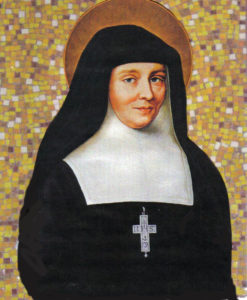 It is a recorded fact that when he said Mass, his face was seen to shine, even as a young Priest, This was remarked by many, as recorded by St. Jane de Chantal in the process for his canonization, for she herself observed it several times.
It is a recorded fact that when he said Mass, his face was seen to shine, even as a young Priest, This was remarked by many, as recorded by St. Jane de Chantal in the process for his canonization, for she herself observed it several times.
When his bishop died, he was consecrated Bishop of Geneva, spending long hours on horseback or on foot, traveling for months visiting all his flock in the mountains. He cared for his Priests, and gave them instructions for preaching well, and he would not permit unworthy candidates to be ordained no matter how much money was offered to him, or families insisted.
He was a friend to the poor. He had his confessional placed at the entrance of the church, so that the poor and the crippled, and even those with repulsive sores, would not be embarrassed to come to confession. “He was most approachable, never turned anyone away; he always listened with unhurried calmness for as long as people felt they needed to talk. He was so patient and attentive that you would have thought this was all he had to do…all left him happy and satisfied” (St. Chantal’s Deposition for his canonization).
He was an eminent spiritual director, and wrote the classic Introduction to the Devout Life which even today is beloved for its simple and practical teaching. He said that devotion is for everyone, the shopkeeper as well as the Priest and Religious, and that it was wrong to keep devotion out of the Court or the marketplace. He was a man ahead of his time. Vatican II was very much according to his teaching. When the Church declared at Vatican I on Papal Infallibility, it was to those very papers of his, written in the Chablais, that were quoted to prove the doctrine (these are now called The Controversies and published by Tan.)
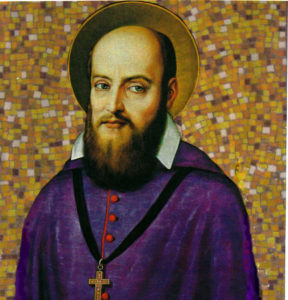 His good friend, St. Vincent de Paul said of him, “there is no one more like the Son of God on earth, than the Bishop of Geneva.” And this he said with tears in his eyes. Yes, St. Francis de Sales had learned from Jesus to be meek and humble of heart, like His Master. It is the constant experience of those who study his life and his virtues, that the more one knows St. Francis de Sales, the more one knows Jesus; so much was his heart like Jesus. He had great respect for the human person, no matter how poor or how despicable. All could come to him with their troubles. “His whole manner of speaking had great dignity and discretion but was at the same time humble, quiet and candid; he never posed, he was completely unaffected and lacked any stiffness” (St. Chantal).
His good friend, St. Vincent de Paul said of him, “there is no one more like the Son of God on earth, than the Bishop of Geneva.” And this he said with tears in his eyes. Yes, St. Francis de Sales had learned from Jesus to be meek and humble of heart, like His Master. It is the constant experience of those who study his life and his virtues, that the more one knows St. Francis de Sales, the more one knows Jesus; so much was his heart like Jesus. He had great respect for the human person, no matter how poor or how despicable. All could come to him with their troubles. “His whole manner of speaking had great dignity and discretion but was at the same time humble, quiet and candid; he never posed, he was completely unaffected and lacked any stiffness” (St. Chantal).
“His incomparable kindness opened the most firmly locked hearts, and he took out what was evil and put solid resolutions and desires there instead. He was extraordinarily decisive and encouraging; he cleared up doubts and scruples on the spot, there and then inspiring perfect reassurance and peace” (St. Chantal’s Deposition).
In 1610, he founded a new Religious Congregation that would accept those of weak or frail health, as well as those who were older, even the crippled and the blind were admitted, as long as they could live the life. He said he wanted to “give God souls of prayer, souls who would adore God in spirit and truth.” He said he wanted his daughters to be “well shod, but have their hearts bare.” This was a great innovation in his day.
He wrote a Treatise on the Love of God, a masterpiece on the ways of God in the soul. He was declared a Doctor of the Church, and named “Doctor of Divine Love.” He taught about God’s goodness and Fatherly care of His children, and to trust in the Providence of God..
He had dealings with the great names of his day, King Henri IV, who admired him and called him “a rare bird.” When he was in Paris, he was a member of Madam Acarie’s Circle, whose members were the spiritual giants of the day; he was influential in bringing the Carmelites into France. He advised Cardinal Richelieu that he should devote himself to his diocese, rather that the Court of France. Had he heeded his advice, there would not have been such a scandal.
Because of his knowledge of law, and because everyone trusted him, he was often asked to bring peace between warring families, and persons of nobility. He was a great peacemaker.
He is also Patron saint of the deaf because a young man of 25 who had been deaf and dumb since childhood was left without help. St. Francis felt such compassion for him that he worked out a sign language for him, and prepared him for his 1st Holy Communion. He remained in Francis service, because of his great love for him.
St. Francis reformed or tried to reform several lax Religious Communities. In his preaching, he never accused the Protestant Reformers, he spoke of the beauty of the Faith, of the Sacraments, particularly of the Real Presence in the Eucharist. Many were converted by listening to his sermons. When Protestant ministers challenged him to a public debate, he always accepted, and was so convincing, that they hesitated to do so again, and would not appear when scheduled. He had read all their works, and knew their tactics. He was always simple and polite, and the people who listened were charmed by his gracious words of truth. How he loved the Church, and knew the heart and mind of the Church! He had a deep understanding of what the Church really teaches.
Even during his life, there were miracles, even bringing a little girl back to life. He also delivered persons who were attacked by the devil, even possessed. After his death, many miracles happened at his tomb. He is beloved by all who know him, and to read his writings, his letters and sermons give the heart the joy of confidence in God and liberty of spirit. Here was a man who truly loved God, and knew the Heart of God
God be praised!
This article was written by the Visitation Nuns in Snellville, Georgia.
Like this:
Like Loading...

 She was inspired to make this doll and all the ensuing ones a religious sister; each showing a different face of mercy and God’s love to the world. Or as Monica says: “Each Monastery Belle represents and celebrates the universality, diversity, cultural richness, conversion, perseverance, and beauty of the Catholic Church.”
She was inspired to make this doll and all the ensuing ones a religious sister; each showing a different face of mercy and God’s love to the world. Or as Monica says: “Each Monastery Belle represents and celebrates the universality, diversity, cultural richness, conversion, perseverance, and beauty of the Catholic Church.” One of her newest dolls (right) is a Sister Servant of Mary Immaculate, an community founded in Lviv, Ukraine. The name she was given is Sr. Mariya Sofiya Oleksandra, S.S.M.I., which means “the wisdom of Mary is the defender and protector of all mankind.”
One of her newest dolls (right) is a Sister Servant of Mary Immaculate, an community founded in Lviv, Ukraine. The name she was given is Sr. Mariya Sofiya Oleksandra, S.S.M.I., which means “the wisdom of Mary is the defender and protector of all mankind.”